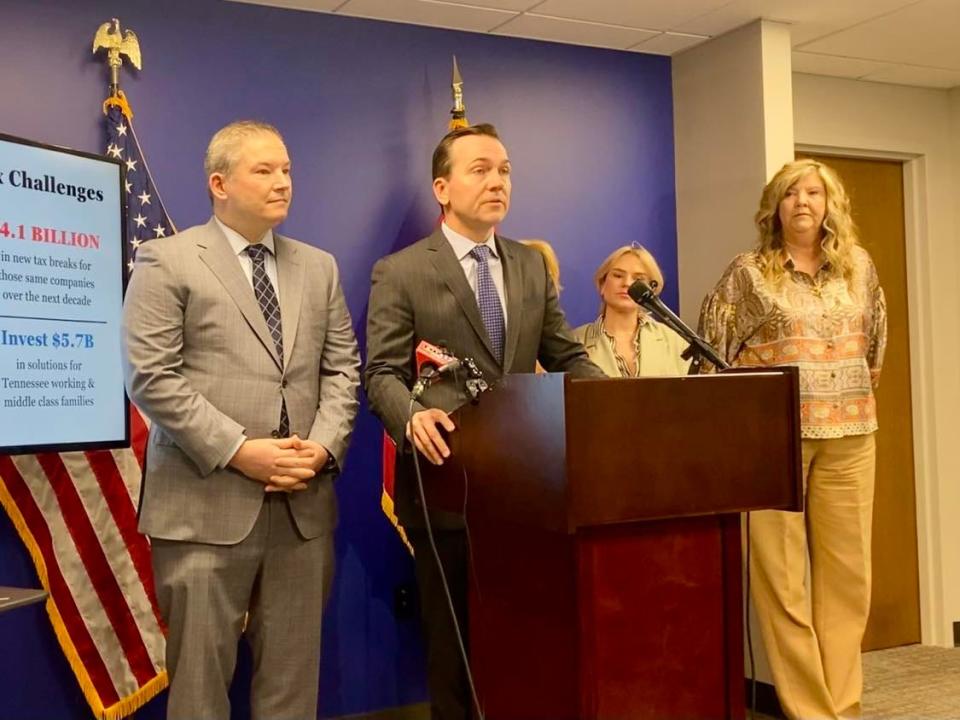Democrats question if Lee tax plan could benefit his private company as alternative push fails
- Oops!Something went wrong.Please try again later.
- Oops!Something went wrong.Please try again later.
House and Senate Democrats are calling on Tennessee Gov. Bill Lee to disclose franchise tax records for the Lee Company – which the governor still owns – to clarify whether his business or family would benefit financially if the legislature approves a proposed $1.9 billion franchise tax break and refund.
Lee, who served as chair and CEO of the Lee Company for nearly four decades before temporarily stepping away in 2019, has no "awareness of the company's operations or business decisions," a spokesperson said. As governor elect, Lee officially stepped away from the Lee Company, and placed his company holdings in a blind trust in order to “eliminate any potential conflicts of interest.”
“The working families of Tennessee deserve to know whether or not Gov. Bill Lee and his company or companies stand to financially benefit from his proposed franchise tax cut,” House Democratic Caucus Chair John Ray Clemmons, D-Nashville, during a news conference Monday. “And if so, how much does the Lee family stand to financially benefit from their own proposals?”

Restructuring how the state charges franchise taxes to businesses is Lee’s single biggest-ticket spending item this year. In response to at least 80 companies approaching the state seeking franchise tax refunds, Lee is proposing to restructure how the state calculates franchise tax charges to companies – a proposal that’s projected to cost the state $400 million each year. He’s also proposing to refund businesses who have paid franchise taxes based in property taxes any time in the last three years.
If adopted, an estimated 100,000 companies in Tennessee could be eligible for a refund of some franchise taxes under the proposal. Those refunds would cost the state up to $1.5 billion, fiscal analysts have found.
Lee's proposal sailed through the Senate Revenue Subcommittee on Tuesday, with no discussion from Senate Republicans. Sen. Jeff Yarbro, D-Nashville cast the lone opposing vote.
Democrats have criticized the proposed refunds as unnecessary and unprecedented and used the news conference Monday to announce an alternative proposal that could reduce the state's legal risk and be revenue neutral.
“I’m not familiar with any states that have just made retroactive payments available before a court has even found that there’s a legal problem,” Yarbro said.
“A refund is when you give him that money that's legally owed. What the governor is proposing is changing the law so that the state owes businesses money,” Yarbro said. “That's not a refund at all. That is just an appropriation of public dollars to private businesses.”
Late last week, 16 House and Senate Democrats delivered a letter to Lee, asking him to publicly release the Lee Company's Franchise and Excise Tax returns for the last four years in the name of transparency and accountability.
In response to questions from The Tennessean on Monday, Lee's office declined to comment on whether his company could benefit financially from his proposed franchise tax refunds, or how much money the state would be required to pay the governor’s company should his proposal pass.
Lee spokesperson Elizabeth Johnson noted that in a blind trust, the governor is prohibited from accessing company tax records, and said “he has no awareness of the company’s operations or business decisions.”
The Lee Company is a $300 million Tennessee-based HVAC, electrical and plumbing company with locations in four states. Prior to taking office, Lee had been directly involved in the company founded by his grandfather since 1981, and was chair and CEO of the company immediately prior to stepping down when elected governor in 2019. He still owns the company.

State law prohibits the Department of Revenue from publicly disclosing taxpayer information.
Lee Company does not have any contracts directly with the state, having ceased all business prior to Lee taking office in 2019. The company’s last contract with the state expired on Aug. 31, 2018.
The Lee Company did not respond to a request for comment.
“The mere appearance of a conflict of interest with regards to significant and costly policy proposals is a sincere concern of mine and my Democratic colleagues, and it should be of great concern to every Tennessee taxpayer,” Clemmons said during the Monday news conference. “Openness in matters of taxation and financial interest is fundamental to maintaining the public’s trust and ensuring the democratic process is conducted with the highest standards of integrity.”
AG stepping back from $1.9B proposal?
Lee has repeatedly said that his proposal was encouraged by tax experts from the Tennessee Department of Revenue and Attorney General Jonathan Skrmetti's office.
Clemmons said he recently met with Skrmetti to discuss the governor’s franchise tax plan. But during the meetings, Clemmons said Skrmetti “went out of his way” to distance himself from the governor’s proposal, saying “in pretty clear terms” that the plan “was not our recommendation,” and “that is not our legislation.”

Brandon James Smith, chief of staff for Skrmetti, did not comment on what the attorney general may have said to Clemmons.
“We cannot comment about legal advice given to our clients, including the Governor and the General Assembly,” Smith said. “It is disappointing to see perceptions of our legal advice be used to foment divisive political discord.”
Skrmetti’s office did not respond to questions from The Tennessean on whether Lee’s proposal is the only possible solution to resolve potential legal risks to the state, or whether the refunds to businesses are indispensable to avoiding legal action.
“It is a matter of basic civics understanding that policy decisions are made by the Governor and the General Assembly, and the role of the Tennessee Attorney General’s office is to provide legal advice to help them make well informed decisions,” Smith said.
Alternative would come at no cost to state
Clemmons, along with Yarbro, D-Nashville, is proposing an alternative to Lee’s plan that they say is aimed at avoiding state payment of “hypothetical damages.”
Yarbro and Clemmons’ proposal, S.B. 2198, would simply establish a tax credit that businesses operating in Tennessee could seek if another state is already taxing the value that’s added in Tennessee. It’s a solution outlined in a 2015 U.S. Supreme Court decision as a potential remedy for states to address the issue.
“The Supreme Court of the United States itself said that when this type of legal issue that’s been raised comes up, the right thing for states to do is enact a tax credit,” Yarbro said.
“I took it right from Justice Alito – where I get all my great ideas,” Yarbro later told The Tennessean with a chuckle.
Fiscal analysts have found the Yarbro and Clemmons proposal would not create significant, immediate costs to the state, and would avoid the $400 million annual expense to the state Lee’s franchise tax restructure.
“What this thing does is it solves this exact same legal problem as the administration is seeking to solve," Yarbro said. "But it does it for $2 billion less."
Yarbro's alternative proposal failed in the Senate Revenue Subcommittee on Tuesday, after no Republican seconded the amendment, preventing the panel from even discussing it.
Vivian Jones covers state government and politics for The Tennessean. Reach her at vjones@tennessean.com.
This article originally appeared on Nashville Tennessean: Democrats call on Lee to release company records, push tax alternative

